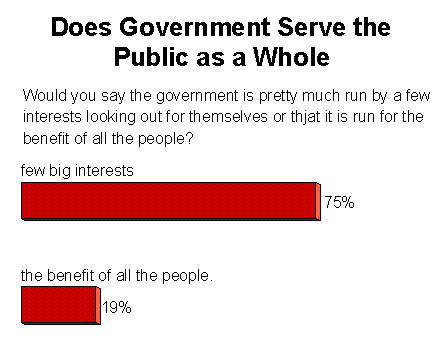

The following conversation is fictional, but may not be too far from the truth. Let's listen in at a banquet event attended by various political insiders some years ago...
Lobbyist: How's the campaign going, Ed?
Senator: Not bad, but we're having to raise more cash this time around to guarantee our margin of victory. Even when you're the incumbent, it never hurts to out-spend them by 3:1 or 5:1 to be on the safe side.
Assemblymember: Too true. Look what happened to Smith last November. Thought he had a safe district, and then wham! Now he's doing time on the Waste Management Board and trying to rebuild his career.
Lobbyist: Well, you know we're in for a few grand as usual, but beyond that I'm afraid the association's budget is about tapped out for this quarter.
Senator: Damn, I hate calling people for money. It's too bad we can't just tap the public to pay for our campaign, the way we tax them to pay for our legislation!
Assemblymember: Ha, they'd never go for that! Can you imagine the headlines? "Pols Want Voters To Subsidize Their Annoying Campaign Ads, Junk Mailers, and Robocalls!".
Lobbyist: (looking thoughtful) You know, I'm not so sure it wouldn't fly. It all depends how you sell it. Call it "campaign finance reform", make the voters think they're getting money out of politics, ending the influence of "special interests".
Senator: (grinning) You mean people like you?
Lobbyist: (grinning) Exactly! Of course we'd still be around lining up the usual contributions for you, but it'd be more indirect, low profile. Officially, you wouldn't have anything to do with our spending on your behalf. Less bad PR for both of us that way.
Assemblymember: Hmm, he does have a point Ed! But imagine the Libertarians and Greens and all the other fringe anti-establishment wingnut candidates receiving public funding... I'm not sure it would be worth it. With more money, some of them could really cause trouble for us.
Lobbyist: Who says they need to get any significant share of the loot? Make it so you first have to raise money in order to get money. A reasonable-sounding formula that meets your needs without rocking the boat too much. I'm sure you guys can come up with something.
Senator: I think I'm sold. (turning to aide) Steven, put "campaign finance reform" on our legislative to-do list!
Aide: Yes, sir!
Now let's fast-forward to San Francisco, 2017...
"In 2000, voters adopted a voluntary partial public financing program for Board of Supervisors candidates,"Joshua Sabatini wrote in the March 29, 2017 San Francisco Examiner.
"In the November supervisor contests, the public financing program provided $1.5 million to a total of 12 candidates. Funds dispersed averaged $126,858 per candidate, with a low of $49,035 and a high of $155,000, the maximum allowed. Candidates who raise $10,000 can receive $20,000 of public funds. For the next $50,000 raised, they are matched $2-to-$1, and for the remaining $35,000 raised, there is a $1 to $1 match."
According to the San Francisco Department of Elections, there were 28 candidates for Supervisor on voter ballots in San Francisco in November 2016, plus an unknown number of write-in candidates whose ranks presumably included anyone who couldn't afford the $500 filing fee to run for supervisor, or the time spent gathering signatures in-lieu of the filing fee from 1,000 registered voters (which, based on my own experience as a petitioner, amounts to working for less than the government-mandated minimum wage), and who, being excluded from listing on the ballot and with scant chances of getting elected, did not bother to file the Statement of Write-In Candidacy, nomination signatures, and Statement of Economic Interests (FPPC Form 700), required to be "official" write-in candidates, required to be "official" write-in candidates whose names would appear in the results.
In other words, fewer than half of the candidates for the eligible offices – and, it's virtually certain, none of the seriously underfunded candidates running write-in campaigns – received any taxpayer funding. But a lucky minority – often those least in need of additional funding – collectively got a million and a half bucks to spend furthering their career ambitions and employing supporters, courtesy of the taxpayers. One such recipient was Ahsha Safai, now elected supervisor for District 11. While on the public campaign finance dole, Safai benefited from a cool $780,327 in spending by outside groups "in support of him alone", the Examiner reported in the article noted above.
It's hard to escape the conclusion that if you've supported public financing of campaigns in San Francisco, you're either a scammer, a tool of scammers, or an unwitting sucker.
